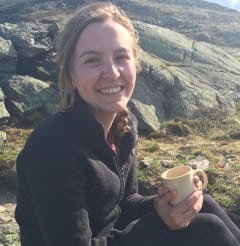Meagan Erhart ’16
Wednesday, July, 11th, 2018 students

Degree and Year of Graduation
M.S. Friedman School of Nutrition Science and Policy; M.P.H. School of Medicine, 2016
Advisor(s)
Fernando Ona; Christian Peters
Fields of Study
Global Health; Food, Agriculture, and the Environment
Why did you join WSSS?
Although I ended up applying to Friedman and becoming a dual degree student, I was initially enrolled only in the Public Health program. I had two main public health interests that I was interested in pursuing, global health and environmental health. Tufts Medical School doesn't have an official environmental health concentration (I later learned that there is an environmental health program in the engineering school), but knowing about my interests, my adviser suggested that I get involved in WSSS and referred me to some other MS/MPH students who were involved.
As soon as I went to the first meeting I knew I was going to participate in WSSS - it seemed like the perfect way to combine and apply my interests in global and environmental health and sustainable agriculture (and hearing the opportunity to implement an aquaponics system in a global setting through the Andros practicum reinforced this).
What was your favorite part of the WSSS program?
My favorite part has been meeting and working with people from a variety of disciplines. I learned different ways of approaching water-related issues, and the value of considering problems from different angles. Prior to WSSS I had little understanding of engineering, for instance, but now I have worked with the engineering department on a few different projects (including our practicum, which had a heavy engineering component.) It was also through WSSS that I met so many people from Friedman, and hearing about what they were doing and studying is part of what led me to actually apply and become a dual degree student.
What was the most challenging part of the WSSS Program?
Coordinating schedules for the symposium. Symposium planners: start early!
What was your favorite water related Tufts course?
Water Biology and Health with David Gute. After taking it I feel like I am better equipped to understand the inner workings of water sanitation infrastructure across a variety of scales, from the city-wide facility here in Boston to one intended for personal household use in a remote village. The exercises that we engaged in over the course of the class provided useful tools that I had not been exposed to in other coursework, and we took some really interesting field trips. Dr. Gute is super enthusiastic and helpful!
What’s one piece of advice for incoming WSSS students?
WSSS becomes busy in the second semester, and you should treat it like a class. The practicum is actually a full credit course so plan accordingly (something I did not realize last spring when I ended up being signed up for 5 1/2 credits.)